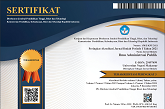Character Based Leadership
(1) S-3 Public Administratiom, Universitas Negeri Makassar
(2) S-2 Public Administration, Universitas Negeri Makassar
(3) S-2 Public Administration, Universitas Negeri Makassar
(4) Office Administration Education, Universitas Negeri Makassar
(*) Corresponding Author
DOI: https://doi.org/10.26858/jiap.v12i2.34820
Abstract
Keywords
Full Text:
PDFReferences
Ahmad Nurabadi. (2014). Manajemen Sarana & Prasarana Pendidikan (Teguh Triwiyanto (ed.); cet 1). Fakultas Ilmu Pendidikan Universitas Negeri Malang.
Akib, H., & Darwis, M. (2015). Pengaruh Gaya Kepemimpinan Transformasional Kepala Sekolah Terhadap Kinerja Guru Pada SMK Negeri 1 Bungoro Kabupaten Pangkep. Jurnal Office, 1(1), 80–87.
Apriliansyah, M. (2021). Women’s Leadership in Strategic Positions in the DPR RI (Case Study on Desy Ratnasari as a Member of the DPR who Occupies a Strategic Position in the DPR RI). Jurnal Ad’ministrare, 8(2), 467–474.
Chairil, A. (2017). Pengaruh Fungsi Kepemimpinan terhadap Motivasi Kerja Pegawai pada kantor Dinas Pendidikan Kabupaten Sinjai. Jurnal Office, 2(1), 1–8.
Haq, M. A., Sailan, M., & Niswaty, R. (2021). The Influence of Leadership Style and Organizational Commitment on Employee Performance of Makassar City Manpower Office. Jurnal Ad’ministrare, 8(1), 179–190.
Hatta, S., Tahir, S., & Baharuddin, B. (2021). Strategy of the Primary and Secondary Education Council of Muhammadiyah Regional Leaders in Maintaining the Quality of Education during the COVID-19 Pandemic Period in Sinjai Regency. Jurnal Ad’ministrare, 8(1), 97–104.
Kanaan, N. (2009). Administrative leadership. Jordan: Dar Al-Thaqafa for Publishing and Distribution.
Kartono, K. (2011). Pemimpin dan Kepemimpinan. Rajawali Grafindo Perkasa.
Laha, M. S., Fatmawada, S., & Asis, A. (2021). The Integration of Transformational Leadership and Application of Multicultural Education at YAPIS Biak Vocational School Papua Province. Jurnal Ad’ministrare, 8(2), 319–330.
Miles, M. B., Huberman, A. M., & Saldana, J. (2014). Qualitative Data Analysis: A Method Sourcebook. Routledge.
Mursak, M., & Sani, K. R. (2021). Management of the Da’wah of the Muhammadiyah Regional Leaders of Sinjai Regency during the Covid-19 Pandemic. Jurnal Ad’ministrare, 8(1), 149–156.
Niswaty, R., Juniati, F., Darwis, M., Salam, R., & Arhas, S. H. (2019). The Effectiveness of Leadership Functions Implementation in The Makassar Departement of Manpower. JPBM (Jurnal Pendidikan Bisnis Dan Manajemen), 5(1), 1–10.
Risma Niswaty Muh. Darwis, Rudi Salam, Sitti Hardiyanti Arhas, F. J. (2019). The Effectiveness of Leadership Functions Implementation in The Makassar Departement of Manpower. Http://Journal2.Um.Ac.Id/Index.Php/Jpbm/Article/View/8609/4032, 5(2019), 1–10.
Rivai, & Mulyadi. (2012). Kepemimpinan dan Perilaku Organisasi. PT Raja grafindo persada.
Rivai Veithzal, & Mulyadi, D. (2012). Kepemimpinan dan Perilaku Organisasi Edisi Ketiga. PT Rajagrafindo Persada.
Samad, M. A., & Hardi, R. (2018). Kepemimpinan Transformasional Walikota Makassar (2014-2019) pada Program Makassar Tidak Rantasa (MTR). Jurnal Ad’ministrare, 5(1), 36–50.
Sedarmayanti. (2014). Manajemen Strategi. Refika Aditama.
Sudaryono. (2014). Leaderships: Teori dan Praktek Kepemimpinan. Lentera Ilmu Cendekia.
Sugiyono. (2018). Metode Penelitian Pendidikan. Alfabeta.
Sukmawati, S., Jamaluddin, J., Niswaty, R., & Asmanurhidayani, A. (2019). The Influence of Headmaster Leadership Style on Teacher Performance. Jurnal Office, 4(2), 91–102.
Sunarsi, D. (2018). Pengaruh Gaya Kepemimpinan dan Disiplin Kerja Terhadap Kinerja Karyawan Pada CV. Usaha Mandiri Jakarta. JENIUS (Jurnal Ilmiah Manajemen Sumber Daya Manusia), 1(2).
Thoha, M. (2014). Kepemimpinan dalam Manajemen. PT RajaGrafindo Persada.
Wirawan. (2013). Kepemimpinan: Teori, Psikologi, Perilaku Organisasi, Aplikasi dan Penelitian. Rajawali Pers.
Article Metrics
Abstract view : 407 times | PDF view : 63 timesRefbacks
- There are currently no refbacks.
Copyright (c) 2022 Rifdan Rifdan, Kamardy Anugrah, Risma Niswaty, Sitti Hardiyanti Arhas

This work is licensed under a Creative Commons Attribution 4.0 International License.
Diterbitkan oleh:
Program Studi Ilmu Administrasi Publik
Program Pascasarjana Universitas Negeri Makassar
JIAP Index By:

This work is licensed under a Creative Commons Attribution 4.0 International License.










